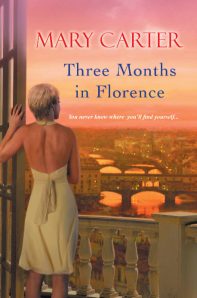 Mary Carter is a freelance writer and novelist. Three Months in Florence is her seventh novel. Her other works include: The Things I Do For You, The Pub Across the Pond, My Sister’s Voice, Sunnyside Blues, She’ll Take It, and Accidentally Engaged. In addition to her novels she has written three novellas: A Kiss Before Midnight in the anthology, You’re Still the One, A Very Maui Christmas in the New York Times best selling anthology Holiday Magic, and The Honeymoon House in the New York Times best selling anthology Almost Home.
Mary Carter is a freelance writer and novelist. Three Months in Florence is her seventh novel. Her other works include: The Things I Do For You, The Pub Across the Pond, My Sister’s Voice, Sunnyside Blues, She’ll Take It, and Accidentally Engaged. In addition to her novels she has written three novellas: A Kiss Before Midnight in the anthology, You’re Still the One, A Very Maui Christmas in the New York Times best selling anthology Holiday Magic, and The Honeymoon House in the New York Times best selling anthology Almost Home.Mary is working on two more novellas for winter and summer of 2014, as well as her eighth novel.
Visit her website at www.MaryCarterBooks.com.
Connect & socialize with Mary at Twitter: https://twitter.com/marycarterbooks
Like her on Facebook: https://www.facebook.com/pages/Mary-Carter-Books/248226365259
Click here to enter the $25 Amazon Gift Card + Books Giveaway!
About the Book:
 Lena
Wallace was supposed to go to Italy on her honeymoon. That was sixteen
years ago. Instead, she settles for cooking Spaghetti Bolognese for her
two children while her husband, Alex, is on yet another business trip to
Florence without her. Lena deals with his absences in the same stoic
way she deals with all her responsibilities. And then comes the call
that changes everything–the one from Alex’s Italian mistress.
Lena
Wallace was supposed to go to Italy on her honeymoon. That was sixteen
years ago. Instead, she settles for cooking Spaghetti Bolognese for her
two children while her husband, Alex, is on yet another business trip to
Florence without her. Lena deals with his absences in the same stoic
way she deals with all her responsibilities. And then comes the call
that changes everything–the one from Alex’s Italian mistress.Stunned and heartsick, Lena flies to Florence to confront Alex. The city is every bit as beautiful as she imagined, from its glittering fountains and cafés to the golden sunsets over rolling hills. But the further she goes to salvage her marriage, the less Lena recognizes herself–or the husband she’s trying to win back. Instead, she’s catching glimpses of the person she once hoped to be and the life and family she truly wants. Most of all, she’s wondering if the real journey is only just beginning. . .
In a novel as warm and vibrant as its rich Italian setting, author Mary Carter explores the intricacies of marriage, the ways love can both liberate and confine, and the journey to happiness that begins with one surprising step. . .
Purchase your copy at AMAZON.
Q: Thank you for this interview, Mary. Can you tell us what your latest book, Three Months in Florence, is all about?
It is about Lena Wallace, a stay-at-home Mom who learns her husband is having an affair while teaching abroad in Florence Italy. Lena flies the family to Florence to confront her husband and his mistress.
Q: Can you tell us a little about your main and supporting characters?
Lena Wallace is a devoted mother, an artist who let her canvas lapse, and a wife desperate to save her marriage. Alex is a professor of art history, and a man tempted by a beautiful, young woman. Alexandria is a drop-dead gorgeous Italian woman. She’s feisty and in love with a married man. Marco, is her equally handsome boyfriend who is also upset by the affair.
Q: Do you tend to base your characters on real people or are they totally from your imagination?
I think a little of myself can’t help but eke into each character, and for Lena I borrowed the name and her looks from a true-life friend of mine, but the similarities stop there. The characters always end up taking off and becoming their own fully-fleshed-out people.
Q: Are you consciously aware of the plot before you begin a novel, or do you discover it as you write?
Truly, a bit of both. I’m required to write an outline for my publisher but he always knows I’m going to veer from it in the process of writing. Sometimes I take huge detours. Writing as you go tends to feel a lot more natural to me, but there are other times where outlines are extremely helpful.
Q: Your book is set in Florence, Italy. Can you tell us why you chose this city in particular?
Simply because I fell absolutely in love with it when I went to visit and I wanted to live there for a year. I didn’t get to, but I did get to experience it again through Lena.
Q: Does the setting play a major part in the development of your story?
Absolutely. Besides seeing it through Lena’s touristy eyes, it was a challenge to have something so ugly happening to Lena in a city so magical and beautiful. That was part of the challenge of writing the novel. And since Florence is such an artistic city, the element of art played a large role in the plot as well.
Q: Open the book to page 69. What is happening?
Lena and the kids are waiting at The Fountain of Neptune for Alex to arrive. He’s coming now….
Q: Can you give us one of your best excerpts?
I would have to sit down and re-read the novel for the best excerpt, but here is a teaser from when Lena is “meeting” the mistress for the first time:
The young woman looks me in the eye, her pretty little chin tilts up, and she keeps her gaze steady. “Yes. I speak English.” She sits back in her chair and waits. Now that her face isn’t taking up the entire screen, I can clearly see that she isn’t in Alex’s dorm. Gone are the plain white walls and the MIchelangelo calendar perpetually open to the statue of David. Here I can make out a kitchen behind her with a squat white refrigerator covered in pictures, and a counter littered with empty bottles of wine, their corks bobbing next to them like murder weapons carelessly dropped next to dead bodies. Besides the wine there is a large basket of fruit and a hunk of yellow cheese sitting on a cutting board. It’s like an Italian still-life painting and it feels as if I can reach out and touch it.
Q: Have you suffered from writer’s block and what do you do to get back on track?
Write. One of my favorite writing quotes—paraphrased—My father drove a truck for twenty years. I don’t ever remember him getting “Truck Drivers Block.” Writing is a job. You just have to do it.
Q: What would you do with an extra hour today if you could do anything you wanted?
I’m going to go against the grain here. I actually have a lot of time on my hands. I can only write so many hours a day, I don’t have kids, and my other freelance work has been quiet lately. So I don’t want an extra hour today. I would probably feel guilty that I wasn’t doing something productive. Were you trying to get me to say I’d use it to write?
Q: Which already published book do you wish that you had written and why?
There are too many of them to mention. A recent one would be Gone Girl. I love psychological suspense and enjoyed the novel along with many others. The Hunger Games—I loved the series. Brilliant premise too. Time and Again by Jack Finney. I wish I had a tenth of the beautiful prose of Colum McCann. Gone With the Wind, of course. City of Thieves, Bel Canto, Racing in the Rain, The Room, Turn of Mind….You’re depressing me now. Can I change my answer to the question above and use my extra hour to drink and think of all the novels I wish I had written?
Q: What kind of advice would you give other fiction authors regarding getting their books out there?
Promotion is a tricky one. It really is. I haven’t hit on a magic formula yet. The one I try to hold onto is that the best thing to do is concentrate on making your next novel as good as you can get it. Oh—and I also wish I had written As Good As It Gets…. I might need an extra two hours….
Q: Thank you so much for this interview, Mary. We wish you much success!
Thank you! I can be found on Facebook, twitter, and marycarterbooks.com.


